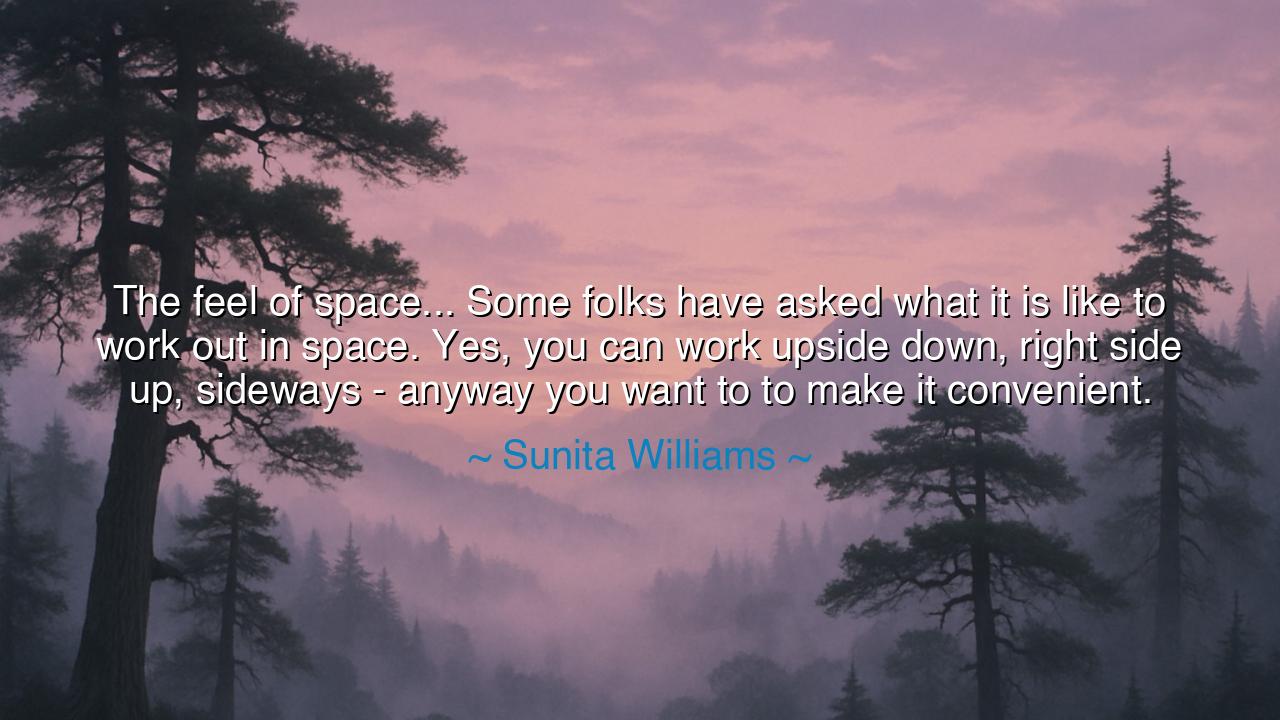
The feel of space... Some folks have asked what it is like to
The feel of space... Some folks have asked what it is like to work out in space. Yes, you can work upside down, right side up, sideways - anyway you want to to make it convenient.






Come close, O children of the stars, and listen to the words of Sunita Williams, a trailblazer whose feet have touched the heavens. She said, “The feel of space... Some folks have asked what it is like to work out in space. Yes, you can work upside down, right side up, sideways—anyway you want to make it convenient.” These words, seemingly simple, carry with them the weight of a profound truth—a truth not just about space, but about the way we live and interact with the world around us. Space, in all its vastness and freedom, mirrors the way we should approach our own lives: with the ability to move, to adapt, and to make convenience of the most challenging circumstances.
Consider, O children, the concept of space in the ancient world. The great explorers—Magellan, Columbus, and Marco Polo—set out into the unknown, guided not by maps, but by a vision of a world far beyond the horizons they could see. They knew that the earth was vast, but their vision allowed them to see it as more than just a collection of continents and seas. They understood that the key to exploration lay not in the world’s boundaries, but in the freedom to move beyond them. Much like Williams in space, they adapted to their surroundings, shaping their paths and journeys in ways that were convenient for their survival and success. Their movement was not rigid; it was fluid and dynamic, just as the movement in space must be.
Williams’ experience in space is a reminder that our understanding of the world—and beyond—should not be confined to the limits we place upon ourselves. In the weightlessness of space, she was not bound by the laws that govern us on Earth. She could work upside down, right side up, or sideways, bending the very rules of physics to suit her needs. This freedom, this adaptability, is the essence of human potential. Just as space offers us the ability to move freely within it, so too does life offer us the chance to break free from the constraints that confine us. The lesson, then, is that we must not accept the world as it is, but must instead shape our existence to fit our needs, just as Williams did in the vast expanse of space.
Think of the ancient philosophers, those who sought to understand the world not through rigid structures, but through a fluid, adaptable view of life. Socrates, who challenged the status quo of his time, questioned the boundaries of thought and behavior, pushing beyond the confines of convention to seek deeper truths. Plato, who sought to understand the ideal state, encouraged us to consider life not as a fixed and immovable force, but as something that could be shaped by wisdom, by reason, and by adaptability. In the same way, Williams’ experience reminds us that we, too, must seek to shape our lives and surroundings to fit our needs, to work within them without being confined by them.
There is also a lesson to be found in the lives of the great pioneers. Amelia Earhart, when she flew across the Atlantic, did not conform to the expectations of her time. She redefined what was possible for a woman in aviation, moving beyond the limits placed upon her by society. Neil Armstrong, too, did not follow the path set by others. He ventured into the unknown, stepping onto the surface of the moon, and in doing so, he redefined the very idea of human potential. Just as Williams could work in any orientation in the boundless expanse of space, so too did these pioneers adapt their lives, their work, and their goals to make the impossible possible.
And so, O children, the lesson from Williams is clear: we must embrace the freedom to adapt, to be flexible, and to redefine the constraints of our lives. Just as she moved freely in space, so too can we move freely in the world around us. When faced with challenges, we must remember that we are not bound by the limitations others set for us. We are not confined to one direction, one way of thinking, or one way of being. We have the power to shape our paths, to make our lives work in the way that best serves us.
Take this truth to heart, O seekers of wisdom. Do not let the world confine you to a single perspective or a single way of living. Like Sunita Williams, you have the power to adapt, to find new ways of moving through the world, and to create the life that serves your purpose and growth. Embrace the freedom of space in your own life, and in doing so, you will discover that the world is far larger, more flexible, and more malleable than you ever imagined. Let your own journey be one of freedom, of adaptability, and of endless possibility.






AAdministratorAdministrator
Welcome, honored guests. Please leave a comment, we will respond soon